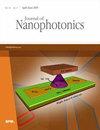Enhancing light emission near low-refractive-index contrast nanostructures via mirror-symmetry breaking
IF 1.1
4区 物理与天体物理
Q4 NANOSCIENCE & NANOTECHNOLOGY
引用次数: 0
Abstract
Abstract. A platform of recent interest and large application potential is one in which the light emitters are directly integrated with an optical metasurface. Plasmonic metals and high-refractive-index, dielectric Mie metasurfaces have been explored in this connection but have their challenges. We propose low-refractive-index, contrast nanostructured thin films for studying metasurface-emitter systems, specifically focusing on two configurations of practical importance: LED white light generation using color converting polymers and fluorescence-based sensing in aqueous media. To achieve light emission enhancement in a low-index contrast, low optical absorption setting, we exploit the excitation of quasi-bound states in the continuum modes in a mirror-symmetry broken grating. Our numerical study predicts widely tuneable sharp-linewidth emission enhancements, near-zero quenching, and large and controllable active volume in the grating vicinity, which are significant improvements in comparison with both plasmonic and high-index contrast, all-dielectric platforms. When compared with simple gratings, mirror-symmetry broken gratings give four times larger radiative enhancement. Our results are of interest in furthering experimental activity and realizing applications such as light converter for efficient white LEDs and smart detection electronics-integrated substrates for sensing.通过镜面对称破缺增强低折射率对比纳米结构附近的光发射
摘要最近感兴趣且具有巨大应用潜力的平台是将发光体与光学超表面直接集成的平台。等离子体金属和高折射率电介质Mie超表面已经在这方面进行了探索,但也存在挑战。我们提出了用于研究超表面发射器系统的低折射率、对比度纳米结构薄膜,特别关注两种具有实际重要性的配置:使用颜色转换聚合物产生LED白光和在水介质中基于荧光的传感。为了在低折射率对比度、低光吸收设置下实现发光增强,我们利用镜像对称破碎光栅中连续模中准束缚态的激发。我们的数值研究预测了可广泛调谐的尖锐线宽发射增强、近零猝灭以及光栅附近的大而可控的活性体积,与等离子体激元和高折射率对比度全介质平台相比,这些都是显著的改进。与简单光栅相比,镜像对称破碎光栅的辐射增强是普通光栅的四倍。我们的研究结果有助于进一步开展实验活动,并实现高效白光LED的光转换器和用于传感的智能检测电子集成基板等应用。
本文章由计算机程序翻译,如有差异,请以英文原文为准。
求助全文
约1分钟内获得全文
求助全文
来源期刊

Journal of Nanophotonics
工程技术-光学
CiteScore
2.60
自引率
6.70%
发文量
42
审稿时长
3 months
期刊介绍:
The Journal of Nanophotonics publishes peer-reviewed papers focusing on the fabrication and application of nanostructures that facilitate the generation, propagation, manipulation, and detection of light from the infrared to the ultraviolet regimes.
 求助内容:
求助内容: 应助结果提醒方式:
应助结果提醒方式:


